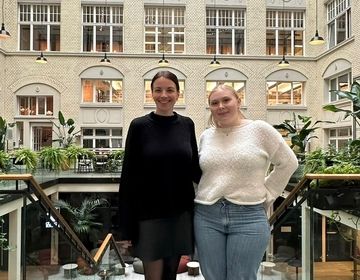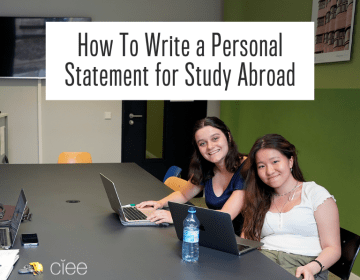Postcard from Abroad: Learning to Leave My Bubble in Berlin, Germany
By Vincent DiFonzo
Almost every time I ride on Berlin’s metro system, the U-Bahn, I am reminded of one of the many little quirks of living in Germany—the German stare. For whatever reason, the German people are known to stare right at you in public. It’s not considered weird or rude. Instead, I’ve learned that it’s considered a social norm here. The advice offered by the staff here at CIEE Berlin is to simply stare right back at them. This is just one minor example of the many little changes that one adjusts to while living in a foreign culture.
I chose to study in Berlin because it's a massive and diverse place with so much to explore. It’s also an international city. About a quarter of people in the city are not German, and the city is home to many thriving immigrant communities. CIEE Berlin is located in the district Kreuzberg, home to a large Turkish-German community who popularized my favorite meal here, the döner kebab.
There are 8 billion people in the world, all with unique lives, feelings, experiences, beliefs and perspectives. Humans collectively speak approximately 7000 languages, practice 4000 religions and call 190+ countries home. Even just in Berlin, there are so many different cultural groups. The world is massive, and in my travels since arriving to study abroad in Berlin, I’ve had the opportunity to leave my personal bubble and see a small slice of it.
Studying abroad is allowing me to get out of my bubble and learn about things and places I otherwise would never get to know. My goal in studying abroad should be to leave my personal bubble as much as possible and engage in what is unknown to me, but this is not always easy. Even in Berlin, I am still in the little American bubble of the CIEE building, and must actively challenge myself to get out and experience a truly different place than what I am used to back in Pennsylvania.
In living abroad, you will encounter so many little things that place you outside of your comfort zone. For example, when I attempt to speak what six weeks of beginner German classes has taught me, I am quickly reminded that Germans speak both better German and often even better English than me. I have mastered “Hallo,” “Danke,” “Bitte” and “Tschüss,” but in any further conversation, my American accent is quite obvious, which prompts the Germans to practice their English with me. Still, I try to practice my severely limited German when possible.
Besides language, a surprising adjustment for me was learning how Germans get rid of waste. Back home it's simple—trash and recycling. Meanwhile, the Germans have a system: “blaue Tonne” for paper and cardboard, “Wertstofftonne” for plastic, “Biomüll” for anything biodegradable, “Restmüll” for general waste and “Glasiglus” for glass, which is further sorted by color. The Germans take their recycling seriously and the culture values environmentalism and discourages waste. And yes, I have accidently used the wrong bin many times since getting here.
Despite discomfort, placing myself outside my personal comfort bubble is how I learn. Through the combination of an open-mind and a willingness to explore new ideas, studying abroad has shown me just how diverse our planet is. Humans are pragmatic, and naturally create ways to overcome the unique challenges facing them. By learning from places unfamiliar to me and highlighting cultural differences, I feel better equipped to deal with my own challenges in my own culture.
At the end of the day, if I leave Berlin with the same exact thoughts, ideas and perspectives as I did when I arrived here, then what would the point have been? Leaving my comfort bubble here in Berlin is not always easy, but it is so very rewarding.
Related Posts

CIEE Study Abroad Housing Options: Everything You Need to Know
If you’re considering a study abroad program, it’s likely that you’re also thinking about your housing options! While you’re anticipating exciting courses and foreign country exploration, having a better understanding... keep reading

Internship Spotlight: Jordyn Forni at Fyrce Care
Meet Jordyn Forni, one of our Open Campus Fall 2025 students! Jordyn has been in Berlin since August, completing both Block I and II. During her time here, she interned at Fyrce Care, a Berlin-based startup and digital platform focused on fertility and reproductive awareness.

How Do I Write a Personal Statement for Study Abroad?
Writing a personal statement is an important aspect of the study abroad application process. However, if you’re unfamiliar with the practice, it can seem overwhelming. Have no fear – CIEE... keep reading
